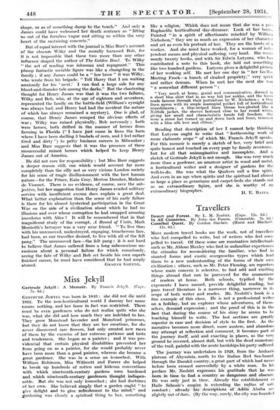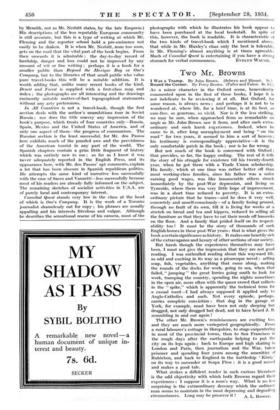Travellers
Desert and Forest. By L. M. Nesbitt. (Cape. 12s. Gd.) MOST modern travel books are the work, not of travellers who feel compelled to write, but of writers who feel com- pelled to travel: Of these some are ruminative intellectuals such as Mr. Aldous Huxley who find in unfamiliar experiences the stimulus for reconsidering the familiar, who find in stunted forms and exotic overgrowths types which lead them to a nen, understanding of the forms of their own civilization ; others, such as Mr. Peter Fleming, are reporters whose main concern is selective, to find odd and exciting things abroad that can be purveyed for the amusement of readers at home. Both schools, typified by the exponents I have named, provide delightful reading, but pure travel literature is a narrower thing, narrower in its scope of both writer and reader. Mr. Nesbitt's book is a fine example of this class. He is not a professional writer on a holiday, but an explorer whose adventures, of them- selves, demand expression ; and the proof of this is in the fact that during the course of his story he seems to be teaching himself to write. The last sections arc greatly superior in ease and decision of style to the first. As the narrative becomes more direct, more austere, and abandons any attempt at reflection and comment, it becomes part of the journey itself, arid and exacting in places, as the very ground he covered, almost dull, but with the dead monotony of the trail, painful with the acute hardships his party suffered.
The journey was undertaken in 1928, from the Amharic plateau of Abyssinia, north to the Italian Red Sea-board. through the Darakil country, a great part of which had never before been crossed successfully by a white man. In his preface Mr. Nesbitt expresses his gratitude that he was born in time to find a country. so dangerous and obscure. He was only just in time. Already the establishment of Haile Selassie's empire is extending the radius of safe conduct ; already his descriptions of Addis Ababa are slightly out of date. (By the way, surely, the city was founded
by Menelik, not as Mr. Nesbitt states, by the late Empress.) His descriptions of the less reputable European community is still accurate, but this is a type of writing at which Mr. Fleming and the reporter school hold a pre-eminence not easily to be shaken. It is when Mr. Nesbitt, none too soon, gets on the road that the vital part of the book begins. From then onwards it is admirable ; the day-to-day record of hardship, danger and loss could not be improved by any amount of wit or fine writing ; perhaps it is a book for a smaller public than Beyond the Mexique Bay or One's Company, but to the libraries of that small public who value pure travel-books this will be a notable addition. It is worth adding that, unlike many recent books of the kind, Desert and Forest is supplied with a first-class map and index ; the photographs are all interesting and the drawings eminently suitable matter-of-fact topographical statements without any arty pretensions.
In All Countries is not a travel-book, though the first section deals with the author's unambitious tour in Soviet Russia ; nor does the title convey any impression of the book's purpose, which treats of four countries only—Russia, Spain, Mexico and the United States of America, and of Only one aspect of them—the progress of communism. The Russian section is the least successful, for Mr. dos Passo' s here exhibits much of the puzzled awe and the peevishness of the American tourist in any part of the world. The Spanish chapters contain a grim little fragment of history which was entirely new to me ; so far as I know it was never adequately reported in the English Press, and its appearance here, with Mr. dos Passos' apt comments, explain a lot that has been obscure in Spanish republican politics. He attempts the same kind of narrative less successfully with the case of Sacco and Vanzetti—less successfully because most of his readers are already fully informed on the subject. The remaining sketches of socialist activities in U.S.A. are of purely local and contemporary interest.
Cannibal Quest stands very low in the class at the head of which is One's Company. It is the work of a Toronto journalist shamelessly out for copy ; his phrases are usually appalling and his interests frivolous and vulgar. Although he describes the sensational rescue of his camera, most of the photographs with which he illustrates his book appear to have been purchased at the local bookstall. In spite of this, however, the book is readable. It is characteristic of the two kinds of travel-book which I mentioned above, that while in Mr. Huxley's class only the best is tolerable, in Mr. Fleming's almost anything is at times agreeable. Much of Cannibal Quest is entertaining if you have a strong
stomach for verbal commonness. EVELYN WAUGH.



















































 Previous page
Previous page